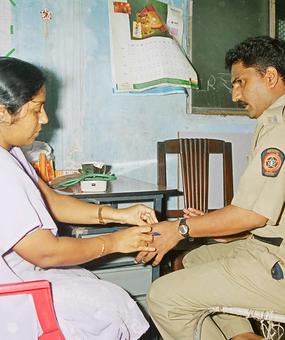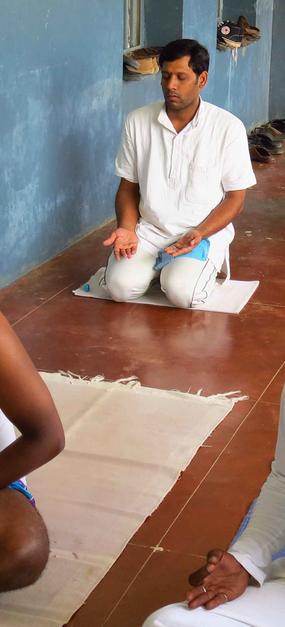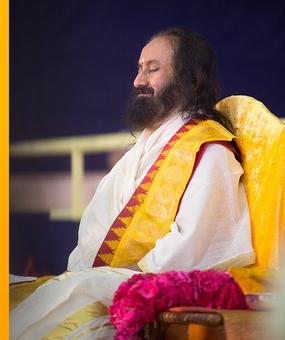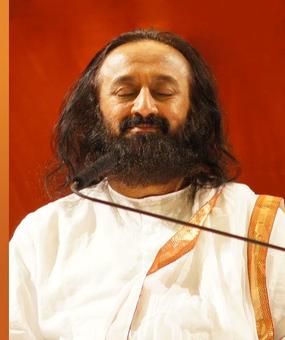Life behind bars entails a routine of daily tasks and chores, yet mentally it is a tumultuous journey filled with emotions ranging from vengeance to remorse. This was the reality until a year ago within the confines of the Bangalore Central Jail. However, in the past year, a remarkable change has occurred. Thirty inmates, convicted of the most severe crimes, have undergone a profound transformation. Despite their past deeds, they have embraced change, embarking on a journey of self-discovery and becoming leaders of change within the prison walls.
Art of Living’s Youth Leadership Training Program
The catalyst for this profound change was the introduction of the Art of Living’s Youth Leadership Training Program (YLTP) within the prison walls. Designed to instill self-reliance and leadership qualities, the program offered a lifeline to those seeking a positive change.
For 90 days, 30 inmates immersed themselves in a regimen of yoga, meditation, and introspection, guided by dedicated mentors. Through the practice of Sudarshan Kriya and other transformative techniques, on their road to recovery and inner healing.
“We did a 90-day YLTP for them, which is a break from the normal structure of the program. The inmates underwent intensive yoga and meditation sessions every day, processes to help them come to terms with their past, and emotions, and learn to manage their minds. There were also evening sessions, filled with singing and sharing practical life tips. This program was essential, especially the Sudarshan Kriya breathing technique to bring about the much-needed change,” informs Nagraj Gangolli, Project Director of the Prison Program for Karnataka.
The participants chosen were mostly convicts who have spent an average of 1-12 years in the prison. The first batches of participants were handpicked by the police. Seeing the transformations in the first batch of participants, the second batch of participants voluntarily joined.
They underwent two advanced programs which healed them of old emotional wounds, self-concepts, attitudes, and fears. It also gave them access to inner stability and faith in themselves and their future.
“Earlier they would while away their time from playing cards to even planning on how to repeat the same crime again in a bigger way after their release. But now it’s different,” said Nagraj Gangolli.
The Rise of Prison Educators
A committee of Art of Living teachers along with the police realized that a more significant transformation would happen when these prison-teachers will teach their fellowmen.
The metamorphosis became evident. Formerly hardened criminals began to shed their old identities, embracing a newfound sense of purpose and positivity. Empowered by their own transformation, they took on the role of mentors, teaching their fellow inmates the principles of meditation and yoga. These once-troubled souls emerged as leaders, earning the title of “yuvacharyas” or youth leaders within the prison community.
“I was given the responsibility of managing meals for all 4000 inmates in the jail. Training other inmates makes me happy and satisfied when I see the change in them,” shared Mohan Kumar, a prison-teacher, adding, “After the program, I felt the pent-up stress of 12 years disappear. Yoga and meditation brought me immense willpower. My outlook towards life changed and my mind became more focused.”
After living in prison for years together, having a sedentary lifestyle with a diminished hope for the future – this was a welcome change say prison authorities.
Deputy Inspector General of State Police, Ravi, said, “The transformation in the general well-being is comprehensive. They were habitual offenders, but once they were transformed through these programs, they became more productive, and their all-around personality changed. Now, they would be absorbed into society easily without any social stigma. The training, which empowered them as yuvacharyas set off a chain reaction wherein they began training other inmates.”
The ripple effects of their efforts spread far beyond the confines of Bangalore Central Jail. Across seven prisons in Karnataka, including Bidar, Bellary, and Mysore, these 30 individuals touched the lives of over 2,500 inmates.
Meeting the Master
After months of dedication and transformation, the 30 inmates were granted a rare opportunity – a visit to the Art of Living International Center to meet Gurudev Sri Sri Ravi Shankar. Dressed in pristine attire, they gathered eagerly, hearts filled with gratitude and determination. In the presence of Gurudev, they found validation and encouragement for their journey. Inspired to continue their efforts for the greater good, they sought his guidance on expanding transformation programs across the state.
This group practiced pranayama and meditated while waiting for Gurudev. Surrounded by policemen who were proud albeit watchful, this group sat without handcuffs – free men as it were, free from a sorry past and determined to live life differently.
Encouraging their transformation and efforts, Gurudev inspired them to continue the good work for nation-building. “We should work towards building trust and bringing about human values in people.” The group also sought Gurudev’s guidance on furthering the transformation programs in prisons across the state.
A 32-year-old Mahesh says, “Nowadays, I simply catch anyone in the jail and put them into yoga classes. I am eagerly praying for my release so that I can see my family and be a good citizen of the country.”
As they sat in meditation, surrounded by the watchful gaze of policemen, these 30 men embodied a newfound sense of freedom – not just from physical constraints, but from the shackles of their pasts. They had not only found liberation within the confines of their own minds but had become powerful examples of prisoner-led leadership.




















